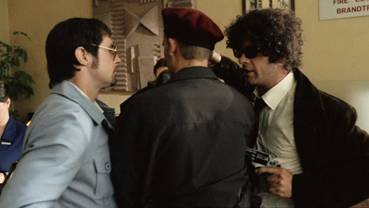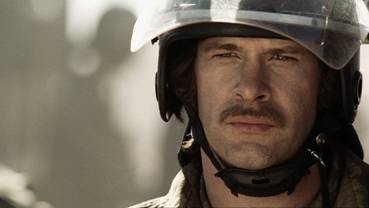| "If
you go fast enough, you can't see where you've come
from." |
| Alan
Heyl to Andre Stander |
It
is said that truth is stranger than fiction. It isn't –
how could it be? Bizarre facts often appear more peculiar
than fiction simply because we know they actually happened. It's that
element that gives 'based on a true story' films their own
unique appeal, though always lurking at the back of my mind
when watching them is the thorny issue of how much much
the truth has been massaged for dramatic effect. I mean,
try this on for size. Andre Stander is a captain in the Robbery
and Homicide Division of the Johannesburg police in 1970s
Apartheid South Africa. One day he decides to rob a bank,
seemingly just to see if he can get away with it, which he does.
The think is, doesn't leave it at just one and takes to robbing banks in his lunch
hour and then returning to the scene of the crime a few
hours later as the investigating officer. A bit far fetched,
huh? Except it's all true. Indeed, the story of Captain
Andre Stander is such an extraordinary and at times outlandish
one that a movie adaptation requires very little embellishment
to shape it into a smart and highly engaging crime
movie.
Given
that these events occurred almost three decades ago, it's
surprising that it's taken so long for a movie
adaptation to appear, and given the quality of the finished
result, why it seems to have reached such a relatively small
audience. But then it's set in South Africa rather than Los Angeles,
and Stander himself is played not by Tom Cruise but Thomas
Jane. Thomas who? Exactly. Jane has done his fair share
of interesting work, but his name just doesn't have the
pulling power to drag a star-struck public into the cinemas.* Which is a shame, because he's bloody great here, physically
imposing when required (at one point angrily taking down
two of his colleagues in one furious leap), but at his most
impressive when stripped of dialogue and action and working
solely through facial expression and body language. Most
of all, he effortlessly projects the enigmatic charm of a character
who caught the imagination of the public to such a degree
that he took on the aura of a folk hero, being particularly cherished
by those who saw his activities as sticking it to a system
they despised.

Although it was never firmly established why Stander first
turned to crime, director Bronwen Hughes has gone with Stander's
own claim, that that it was the indirect result of participating
in a savage crackdown on a township demonstration. A pivotal
moment for Stander, this protest and its violent aftermath
are electrifyingly staged, shot with documentary realism
and a genuine sense that the ruling authority, despite having
the guns and the dogs and the clubs, has long since lost
the moral battle. Every shot and edit counts here, the camera
repeatedly returning to Stander's face as his uncertainty
and apprehension give way to a disbelief at what he realises
is unfolding. The shooting that so haunts him happens
almost by accident, a misreading of a threat that results
in the death of an innocent, a moment that plays against
expectations when Stander, instead of throwing down his
gun in horror, then frenziedly opens fire at everything
that moves.
Removed
from riot duty at his own request, Stander's relationship
with his wife and his father, himself a retired police official
of some standing, begins to deteriorate, as does his enthusiasm
for a job with which he has become increasingly disillusioned.
"A white man could get away with anything today!"
he barks at the desk officer in an almost empty police station,
and then goes on to prove it by marching to a nearby bank
and holding it up. So shaken is he by what he has done that he immediately
disposes of the money by giving it to a young roadside paperboy,
and the myth of his modern-day Robin Hood status is born.
What starts as an impulsive action soon becomes an addiction,
his confidence growing with each successful heist, not least
because he is wise to every aspect of the investigation.
When one teller seems to recognise him on his return to
the bank in his official capacity, he makes a joke of the
suggestion and it is laughed off by all concerned. And why
not? The very idea of a police captain being the man behind
the robberies is absurd enough, but to suggest that he would then return to the bank to interview the witnesses
borders on the ridiculous. But that's how it happened. Whatever
else you might think about Andre Stander, he clearly had
the biggest balls in the force.
The
effect of all this on Stander is to reinvigorate him, restoring
his good humour and firing up his sexual desire. He's clearly
set for a fall and it happens when he is caught by his own
partner. "What took you so long?" he asks. "We're
not as good as you" is the humble response.** It is
in jail that Stander meets and befriends future partners in crime Alan Heyl and Lee
McCall (David O'Hara and Dexter Fletcher respectively, both
on fine form). He escapes with McCall and then, in an extraordinarily
reckless move that became typical of the man, returns to
the prison to fulfil a promise and spring Heyl.*** As a gang,
they go back to robbing banks, increasingly upping the ante,
at one point even goading the task force set up to catch
them by robbing a bank located next door to their command centre.****
Eventually, inevitably, it comes to an end, but even here
the true story provides its own series of resolutions that
could have been written for the movie, and are, minor poetic
licence aside, once again historically on the nose.
It's a remarkable tale, told with energy, pace and inventiveness
in all departments. We may not really get to know Stander as well
as we'd like, but he remains a compelling centrepiece in
a film that deserves to find a far wider market than it
has, and establishes director Hughes, previously responsible
for the lightweight romantic comedy Forces of Nature,
as a talent to be reckoned with. And in an industry still
under largely male control, its rather nice to see a woman
beating the men at their own game.
Framed
1.76:1 and anamorphically enhanced, this is a solid transfer,
whose visible film grain, sometimes high contrast and slightly off-kilter
colour scheme were all there in the cinema and should not
be seen as transfer quirks. Sharpness is fine, black levels
are strong and detail even in the darker scenes.

The
5.1 soundtrack, when cranked up, is very nice, with an effective
and purposeful use of the surrounds, especially in the riot
scene, which is discussed in this respect on the commentary track.
As a mix this is impressive without ever showing off for
the sake of it, with even the LFE channel kicking in just
when it feels right, emphasising the noise and industry
of the prison factory, and so forth.
Good
commentary tracks are DVD gold,
and this is a very good commentary. Director Bronwen Hughes
supplies a wealth on information on the filming, the real
Andre Stander, the locations and the actors, and having a particular
soft spot for – believe it or not – Dexter Fletcher. Especially
fascinating are the stories about shooting on the locations
in which key incidents actually occurred, including the
prison in which Stander, Heyl and McCall served time, bringing
Hughes into contact with people who knew Stander and were
witness to the story being told, which itself helped reshape
the script. The detail on the filming of riot scene was
especially welcome.
The trailer (0:50) is non-anamorphic
widescreen is a dialogue-free sell and in OK if not exactly
sparkling condition.
The
Deleted Beach Scene (3:21) is
referred to by Hughes in the commentary and an engaging
inclusion. It's non-anamorphic widescreen.
Finally
there is Anatomy of a Scene (24:41),
an episode of the fine Sundance Channel series in which
film-makers discuss the shooting and editing of a key scene
from a selected film. Unsurprisingly and pleasingly, the
sequence under examination here is the township riot, which
is deconstructed in useful detail. Particularly interesting
is the side-by-side comparison with archive news footage
of township demonstrations and the police reaction to them.
The picture here is a mixture of 4:3 and non-anamorphic
widescreen.
Stander
is a captivating retelling of a remarkable true story, an
engaging character study, a first rate crime/caper movie
and even at times a nifty action film. The pace rarely drops,
and the politics of the situation are intriguingly woven
into the story, including a most unexpected attempt at redemption
by the lead character. But most of all it deserves to find
a far greater audience than it seems to have reached to
date, and if you didn't catch it on its disappointingly
limited cinema run then I urge to hunt out the DVD, which
looks and sounds good and has some very decent extras. Stick
it on your Christmas list – you won't be sorry.
* [2023 ammendment] In the years since this review was written Thomas Jane's star has risen considerably and his name can indeed now be used to sell a movie. That said, he stiull doesn't have quite the pulling opower of Cruise. Then again, who does?
** In a rare deviation from the facts, Stander
is caught through a combination of luck and deduction, whereas
in truth he admitted his crimes to his partner and tried
to get him to join him, only to have his confession reported to his superiors.
*** Again a true story, with the post-escape events playing out exactly as they did in real life.
**** The real bank was downstairs from the task force rather
than next door, but yet again, they really did rob it under
the noses of the men who were looking for them.
|